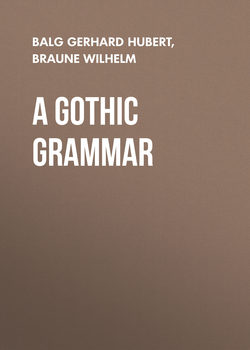Читать книгу A Gothic Grammar - Braune Wilhelm - Страница 22
INFLECTION
CHAP. I. DECLENSION OF SUBSTANTIVS
APPENDIX.
DECLENSION OF FOREN WORDS
Оглавление§ 119. A number of foren words from the Latin and Greek wer fully adopted into the Gothic language thru commercial and political intercourse, so that their inflection is the same as that of purely Gothic words; e. g., pund, n., pound; marikreitus, m., perl; Krêks, m., Greek; karkara, f., 'carcer'; alêw, n., oil; kaisar, m., Cæsar.
§ 120. A second portion of foren words wer at a later period forced on the Gothic language by Christianity and especially by the version of the Bible. To these belong for the most part proper nouns which ar stil felt to be foren elements and hav but imperfectly adopted the Gothic inflection. For their treatment in Gothic no fixt rules can be givn. Sumtimes they retain their Greek inflection, sumtimes they take either similar or arbitrarily formd case-endings. – Cp. Bernhardt's 'Vulfila', p. XXVIII, and especially M. H. Jellinek, 'Beitr. zur erklärung der german. flexion' (Berlin 1891), pp. 76-84.
Note 1. Most consistent is the treatment of the Gr. masculins in – ος, Lt. – us, which inflect in Gothic according to the u-decl. (§§ 104, 105); e. g., Paítrus, Barþaúlaúmaius, Teitus, aípiskaúpus, ἐπίσκοπος; apaústaúlus, ἀπόστολος; aggilus, ἄγγελος; sabbatus, sabbath. But only in the sg. pl. forms follow mostly the i-decl.; e. g., apaústaúleis, sabbatins, aggileis, aggilê beside aggiljus.
Note 2. Greek case-endings ar retaind in the neuters alabalstraún, ἀλάβαστρον; praitôriaún, πραιτώριον, etc.; Israêleitês has the nom. pl. Israêleitai = Ἰσραηλῖται; Rom. IX, 4; or (with Gothic inflection) Israêleiteis; II. Cor. XI, 22.
Note 3. The following exampl may illustrate arbitrary inflection. The Gr. ἐπιστολή is represented in Goth. by aípistaúlê (nom. sg.). But the dat. sg. is aípistaúlein, the dat. pl. aípistaúlêm, and the acc. pl. aípistaúlans.
